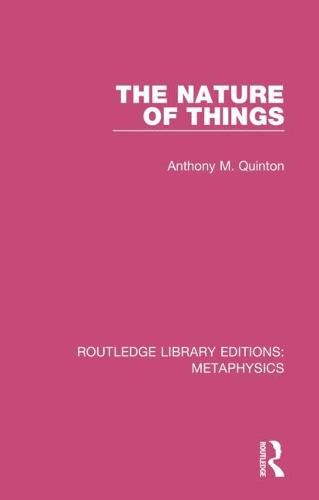Readings Newsletter
Become a Readings Member to make your shopping experience even easier.
Sign in or sign up for free!
You’re not far away from qualifying for FREE standard shipping within Australia
You’ve qualified for FREE standard shipping within Australia
The cart is loading…






Originally published in 1973. In this systematic treatise, Anthony Quinton examines the concept of substance, a philosophical refinement of the everyday notion of a thing. Four distinct, but not unconnected, problems about substance are identified: what accounts for the individuality of a thing; what confers identity on a thing; what is the relation between a thing and its appearances; and what kind of thing is fundamental, in the sense that its existence is logically independent of that of any other kind of thing? In Part 1, the first two problems are discussed, while in Part 2, the third and fourth are considered. Part 3 examines four kinds of thing that have been commonly held to be in some way non-material: abstract entities; the un-observable entities of scientific theory; minds and their states; and, finally, values. The author argues that theoretical entities and mental states are, in fact, material. He gives a linguistic account of universals and necessary truths and advances a naturalistic theory of value.
$9.00 standard shipping within Australia
FREE standard shipping within Australia for orders over $100.00
Express & International shipping calculated at checkout
Originally published in 1973. In this systematic treatise, Anthony Quinton examines the concept of substance, a philosophical refinement of the everyday notion of a thing. Four distinct, but not unconnected, problems about substance are identified: what accounts for the individuality of a thing; what confers identity on a thing; what is the relation between a thing and its appearances; and what kind of thing is fundamental, in the sense that its existence is logically independent of that of any other kind of thing? In Part 1, the first two problems are discussed, while in Part 2, the third and fourth are considered. Part 3 examines four kinds of thing that have been commonly held to be in some way non-material: abstract entities; the un-observable entities of scientific theory; minds and their states; and, finally, values. The author argues that theoretical entities and mental states are, in fact, material. He gives a linguistic account of universals and necessary truths and advances a naturalistic theory of value.